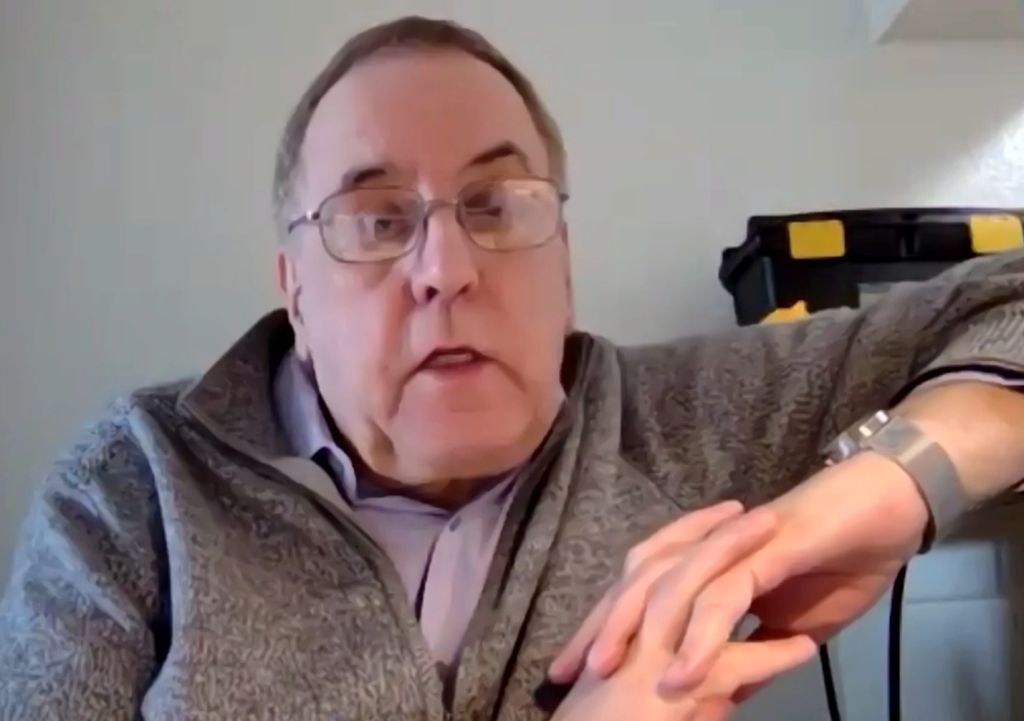Plugged into Hollywood: Brit tech hack in tinseltown
“INITIALLY, I was a gear junkie." That's media production gear, by the way: hardware for recording sound and vision. Long-time NUJ member Mel Lambert was recounting to February's London Freelance Branch meeting about his career working as a freelance writer in Hollywood - yes, that Hollywood - for the last 40 years.

Mel Lambert addresses the meeting
The very name of the movie town conjures visions of sunshine, glamorous pool parties and Oscar ceremonies. But as every freelance knows, the real opportunity lies beyond the obvious. Mel found his niche writing not about stars and celebs but about the behind-the-scenes creative work that supports Hollywood's entertainment powerhouse. As he put it: "My focus is on the technology, production techniques and unsung people that make movie magic."
It's a long way from grey London skies, and perhaps a surprise to some of those who joined the February meeting who would have known Mel better as the Branch's hard-working Membership Secretary, until he stood down last month. How did he end up in Tinseltown?
"Well, the job was there. I emigrated to the West Coast in 1980 to join a trade magazine that focused on equipment used by the recording broadcast, motion picture and live performance industries. I'd been covering such activities in the UK since the mid-1970s."
Back then, he pointed out, there were as many recording studios in Los Angeles alone as there were in the whole of the UK. Forty years ago, many of the major record labels and producers were based on the West Coast, not to mention radio and TV networks alongside independent broadcast and post-production facilities. For Mel, this was "hog heaven" for an "equipment geek like me".
It wasn't long before he shifted from writing about the hardware to investigating the wider creative process. What were the motivations of the sound editor or mixer? What tools did they use (of course) but why? And how did they work with other members of the creative team?
The West Coast music industry has changed considerably over the last couple of decades, thanks to declining single and album sales - "clobbered" by streaming services, Mel confirmed - leading to artists and producers using less costly hardware in home studios. So Mel simply did what freelances do: he shifted as well, choosing to focus more on the film industry's post-production processes for editing images and movie soundtracks.
Now for the elephant in the room. Entertainment industries are reputedly highly strung when it comes to what is written about them, so what must it like in a place such as Hollywood? It is tightly controlled by publicists? Do they demand copy-approval?
The relationship between advertising and editorial is very different in the US compared to that in the UK, Mel observed. Publishers in the US, he felt, are more likely to reward an ad booking with prominent editorial about the advertiser. "Money talks in America."
Despite this, Mel reminded Branch members that freelance writers should just focus on what they do best: build and maintain contacts; build relationships with figures in the industry; invite them to talk about their work and upcoming projects. "They are friendly once you have a reputation for quoting them accurately."
He stressed that copy-approval is never his to give: that's up to his commissioning editors. What he did believe in, though, was in providing "fact-checking proofs" to allow the creative people he has interviewed to have a second look at what they had said, just in case.
He felt it helped build their confidence in his capabilities as an honest interviewer, and has led to him getting quicker responses when researching subsequent articles. It also meant his articles are accurate first time round, rather than the publication being put in the position of having to run a subsequent correction or even an apology.
Mel said he draws the line when somebody not involved in the interview tries to interfere after the event.
"Sometimes a sanitised version comes back to you, that you can see has been touched by somebody who's got slick hands, usually a publicist looking after the interests of the company rather than individual." It doesn't happen very often; indeed he said he found most PRs very friendly and understanding, even if a few could be awkward.
Mel recounted an occasion on which a publicist snatched his business card from the hands of someone he had just interviewed and handed it back. This petty demonstration meant Mel was expected to restrict himself to making all further contact through the publicist - "embarrassing me and embarrassing the guy I was talking to."
On this, he was adamant. "I don't let somebody else change their colleagues' quotes, because that's unreasonable… I stand by what I write. I don't write it because somebody pays me. I write it because I believe it's a service to the readership of the magazine."
Finally, we have to ask: what's it like in Hollywood? Do you see lots of stars walking around?
"A lot of local citizens work in the entertainment-related industries so they're familiar with their clients and seeing them in the street is commonplace. And there are film and TV shoots around town. You see trailer cars whisking by, usually with a police escort.
"Artists, actors, even producers and directors, are seen pretty much everywhere pumping gas [translation: "filling their cars with petrol"] and shopping in supermarkets and department stores. It is so common that very few people bother them for autographs."
![[Freelance]](../gif/fl3H.png)